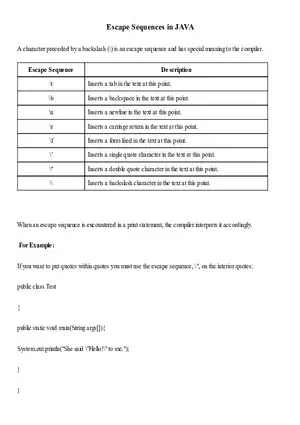Study Guide
Chapter 10 Object-Oriented Programming Polymorphism
-
University:
Kentucky State University -
Course:
COS 129 | Introduction to JavaScripts Academic year:
2024
-
Views:
439
Pages:
3
Author:
imophulebf9
Related Documents
- Networking Fundamentals: Quiz 10 - Exploring Computer Science Concepts
- Constructor, Inheritance and Method Overriding
- Examination of Histograms
- Exam Notes: Unit 7 Level 3
- Unit 18B. The Rate of Reaction Between HCl and CaCO3
- Compressing Data Assignment
- The Resilience and Enduring Relevance of UNIX
- How do You Determine the Shortest Path Between Two Nodes in a Weighted
- The Concept of Recursion Work in Solving Problems
- Fundamentals of Statistics
- Java Design Patterns & Streams Quiz 12: Test
- Environmental Justice and African American Literature
- African American Folklore and Oral Traditions
- Exploring the Harlem Renaissance Through Literature
- Graph Theory Principles and Data Structures
- The Rise of Virtual Reality
- Polymorphism, Generics and Encapsulation
- Introduction To Object Oriented Programming
- Interface and Abstract Class
- Java Database Connectivity Quiz 11
Report
Tell us what’s wrong with it:
Thanks, got it!
We will moderate it soon!
Report
Tell us what’s wrong with it:
Free up your schedule!
Our EduBirdie Experts Are Here for You 24/7! Just fill out a form and let us know how we can assist you.
Take 5 seconds to unlock
Enter your email below and get instant access to your document





